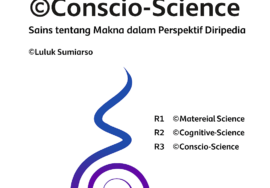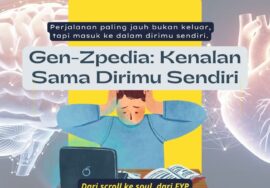Membangun Filsafat Trialisme: Pengetahuan Holistik tentang Diri Manusia untuk Membangun Jiwa Bangsa (1)
Oleh : H. Luluk Sumiarso
Pendiri dan Ketua NioD -ndonesia
(The Nusantara Institute for Diripedia)
Abstract
The development of Trialism Philosophy in “Membangun Filsafat Trialisme: Pengetahuan Holistik tentang Diri Manusia untuk Membangun Jiwa Bangsa” (Building the Philosophy of Trialism: Holistic Knowledge of the Human Self to Build the Nation’s Soul) offers a comprehensive framework for understanding human existence through the integration of three essential elements: Raga (Body), Jiwa (Soul), and Sukma (Spirit). Rooted in the concept of Diripedia, this philosophy emphasizes a holistic approach to self-knowledge, transcending mere physical and mental understanding to include spiritual awareness as a crucial component of human life.
The book begins with the background and challenges of developing a philosophy that acknowledges these three elements of the self, highlighting the often-overlooked need for a balanced understanding of the human condition. It explores the detailed taxonomy of the self, delving into the dimensions of the Body (R1), Mind (R2A), Emotions (R2B), and the Core of Being (R3), examining their unique roles and interconnectedness in shaping human experience and behavior.
The book further delves into the foundational principles of Trialism Philosophy, positioning it against existing philosophical frameworks such as Monism and Cartesian Dualism. It argues for the unique contribution of acknowledging three distinct realities: the Objective (R1), Subjective (R2), and Transcendent (R3). Through the exploration of human thought patterns, emotional responses, actions, and spiritual reflections, it establishes a comprehensive view of human life that promotes wisdom, resilience, and spiritual awareness.
By integrating these elements into everyday life, the Philosophy of Trialism aims to foster holistic personal development that not only enhances individual well-being but also contributes to building a stronger national character. The ultimate goal is to create a balanced human being—physically fit, mentally resilient, and spiritually aware—who can play a pivotal role in advancing society. This philosophy serves as a call to action for individuals and communities alike, aligning personal growth with the broader mission of building the nation’s soul in line with the ideals of Indonesia Raya: “Build the soul, build the body, for Indonesia Raya.”
This work seeks to inspire a deeper engagement with the self, advocating for a holistic path to personal and collective fulfillment that aligns with the values of harmony, integrity, and spiritual consciousness, thus paving the way toward a more enlightened and resilient society.
Pendahuluan
Judul “Membangun Filsafat Trialisme: Pengetahuan Holistik tentang Diri Manusia untuk Membangun Jiwa Bangsa” bertujuan untuk menangkap esensi pengembangan sebuah filsafat yang melampaui diskursus teoretis dan memiliki implikasi praktis dalam membangun jiwa bangsa melalui pemahaman diri yang lebih mendalam. Dengan mencakup elemen dari kesadaran diri hingga implementasi pola pikir, emosi, tindakan, dan refleksi spiritual, judul ini beraspirasi menjadi platform pembelajaran terstruktur tentang diri manusia yang holistik, sejalan dengan tujuan lebih luas untuk memberikan kontribusi filosofis dan praktis dalam pembangunan karakter bangsa. Judul ini mendukung misi dan visi dari Filsafat Trialisme yang sedang dikembangkan di NioD-Indonesia (The Nusantara Institute for Diripedia).
Tulisan serial ini diharapkan menarik pembaca yang tertarik dengan filsafat, pengembangan diri, dan kontribusi terhadap masyarakat.
Latar Belakang Masalah
Perjalanan membangun Filsafat Trialisme Diripedia dimulai dari kesadaran akan pentingnya memahami diri manusia secara menyeluruh, melampaui dimensi fisik dan mental semata. Dengan mengintegrasikan tiga elemen diri—Raga, Jiwa, dan Sukma—serta membuktikan eksistensinya melalui berbagai metode, Filsafat Trialisme Diripedia menyediakan fondasi filosofis yang kokoh untuk memahami keberadaan manusia secara holistik. Melalui integrasi pemahaman Diripedia dan pengembangan Filsafat Trialisme, kita berupaya untuk tidak hanya meningkatkan kesadaran diri tetapi juga membangun kehidupan yang seimbang, bijaksana, dan bermakna.
Dalam masyarakat modern, pemahaman tentang diri manusia sering kali terabaikan. Meskipun banyak orang memiliki pengetahuan yang mendalam di berbagai bidang, mereka justru sering kali tidak memahami atau mengenal dirinya sendiri. Ini menjadi titik awal dari tantangan dalam mengembangkan konsep pemahaman diri yang lebih holistik dan komprehensif. Hal ini menimbulkan pertanyaan mendasar: Mana yang harus dikembangkan terlebih dahulu, pemahaman tentang Diripedia atau Filsafat Trialisme sebagai landasan dasarnya?
Awalnya, saya terinspirasi oleh syair lagu kebangsaan “Indonesia Raya” yang berbunyi, “Bangunlah jiwanya, bangunlah badannya, untuk Indonesia Raya.” Syair ini menyampaikan pesan mendalam tentang pentingnya mengembangkan tiga dimensi fundamental dari diri manusia: jiwa, raga, dan semangat kebangsaan. Pesan ini menekankan perlunya membangun jiwa sebelum raga, menyoroti prioritas pengembangan karakter dan kesadaran individu sebagai fondasi utama kehidupan berbangsa. Mengapa syair tersebut menggunakan kata “badan” dan bukan “raga,” yang lebih umum sebagai padanan dari “jiwa”?
Tema serupa juga muncul dalam lagu “Bagimu Negeri” karya Kusbini, yang berbunyi, “Bagimu negeri, jiwa raga kami…,” yang kembali mengindikasikan tiga elemen utama: semangat kebangsaan, jiwa, dan raga. Frasa “untuk Indonesia Raya” dan “bagimu negeri” mengisyaratkan elemen ketiga yang berupa spirit atau roh kebangsaan. Kedua lagu ini menjadi pengingat bahwa membangun bangsa tidak hanya membutuhkan perhatian pada aspek fisik, tetapi juga pada dimensi mental dan spiritual manusia.
Inspirasi lebih lanjut datang dari diskusi mengenai buku “Candra Jiwa” karya Ki Sunarto (1936), yang kemudian menjadi disertasi di Universitas Leiden oleh Prof. Dr. dr. Soemantri Hardjoprakoso dengan predikat cum laude. Disertasi ini mengakui keberadaan tiga unsur diri: Jasmani Kasar (Raga), Jasmani Halus (Jiwa), dan Roh Suci sebagai pancaran cahaya ilahi. Konsep ini kemudian diperluas oleh Prof. Dr. Budhi Setianto Purwowiyoto dalam bukunya MAGNUM OPUS – Candrajiwa Indonesia: Warisan Ilmiah Putra Indonesia (2016).
Menggabungkan gagasan-gagasan ini, saya merumuskan konsep Diripedia, yang berarti “pengetahuan holistik tentang diri manusia,” yang mencakup Raga, Jiwa, dan Sukma, serta digali dari ajaran luhur Nusantara untuk menciptakan insan paripurna: raga yang bugar, jiwa yang tegar, dan sukma yang sadar. Dalam konsep ini, saya memetakan berbagai parameter terkait tiga elemen, seperti realitas diri, alam diri, manifestasi diri, dan aspek lain yang mendukung pengembangan manusia secara menyeluruh.
Ketika konsep ini dibahas dalam sebuah podcast bersama Bapak Jaya Suprana, beliau mengatakan bahwa apa yang saya kembangkan adalah “Filsafat Diripedia.” Pernyataan ini menjadi tantangan pribadi bagi saya untuk mengembangkan Filsafat Diripedia yang berlandaskan eksistensi tiga elemen diri. Saya kemudian menggali lebih dalam untuk menemukan landasan filsafat yang bisa mendukung konsep ini, terutama dalam membuktikan keberadaan masing-masing elemen tersebut.
Penelusuran saya membawa saya ke berbagai aliran filsafat, seperti Monisme yang berfokus pada satu keberadaan; Dualisme Cartesian yang mengenal dua keberadaan (tubuh dan pikiran); dan Trialisme Cottingham yang menambahkan sensasi sebagai faktor dalam Dualisme Descartes. Namun, belum ada yang secara spesifik membangun filsafat berdasarkan keberadaan tiga elemen diri sebagai fondasi utama. Filsafat Trialisme Cottingham, misalnya, berlandaskan tubuh dan pikiran serta interaksi keduanya yang disebut sensasi, yang bukan dianggap sebagai elemen diri.
Dengan demikian, saya merasa terdorong untuk mengembangkan Filsafat Trialisme Diripedia, yang secara khusus dibangun atas keberadaan tiga elemen: Raga, Jiwa, dan Sukma. Selama proses pengembangan ini, muncul pertanyaan tentang mana yang harus dikembangkan terlebih dahulu: pemahaman tentang Diripedia sebagai konsep holistik tiga elemen diri, atau Filsafat Trialisme yang menyusun konsep-konsep ini secara filosofis? Seperti dilema telur dan ayam, keduanya saling terkait dan berkembang secara paralel.
Diripedia memberikan konteks dasar dan kerangka kerja bagi keberadaan tiga elemen ini, sedangkan Filsafat Trialisme merinci dan menerapkan konsep-konsep tersebut dalam bentuk filsafat yang lebih terstruktur. Dalam konteks ini, keduanya tidak dapat dipisahkan karena saling mendukung dan memperkuat. Oleh karena itu, pengembangan Filsafat Trialisme Diripedia dilakukan secara bersamaan, dengan masing-masing elemen mengisi kekosongan yang ada dan membentuk konsep yang utuh.
Tantangan utama dalam membangun Filsafat Trialisme Diripedia terletak pada pembuktian keberadaan ketiga elemen ini. Keberadaan Raga (fisik) dapat dengan mudah dibuktikan melalui persepsi indera atau alat bantu. Keberadaan Jiwa (pikiran dan emosi) dapat dibuktikan melalui aktivitas kognitif dan respons emosional yang dipicu oleh rangsangan internal dan eksternal. Namun, untuk membuktikan keberadaan Sukma sebagai elemen spiritual yang transenden, saya mengembangkan metode yang saya sebut “Mahkamah Rohani,” yang terinspirasi dari sinetron TVRI berjudul Mahkamah karya Asrul Sani, di mana setiap individu menjadi jaksa, terdakwa, dan hakim atas dirinya sendiri.
Metode Mahkamah Rohani memberikan pendekatan yang lebih introspektif dan personal dalam membuktikan keberadaan Sukma, menegaskan bahwa setiap individu dapat merasakan dan mengakui keberadaan elemen spiritual ini melalui refleksi dan suara hati. Dengan demikian, pengembangan Filsafat Trialisme Diripedia menjadi lebih terarah dan beralasan, menjembatani pembuktian eksistensi fisik, mental, dan spiritual.
Kesadaran akan pentingnya memahami diri manusia secara holistik menjadi landasan kuat dalam mengembangkan Filsafat Trialisme Diripedia. Melalui Diripedia, kita tidak hanya membangun pemahaman diri yang lebih dalam, tetapi juga berkontribusi dalam membangun jiwa bangsa sebagai fondasi utama menuju kemajuan Indonesia. Pandangan ini sejalan dengan semangat “Bangunlah jiwanya, bangunlah badannya” sebagai ajakan untuk membangun manusia paripurna yang menjadi fondasi utama bagi kemajuan bangsa.
(Bersambung)
Halongbay, Vietnam tgl. 7 September 7, 2024, “Harinya TyphoonYagi ”
Introduction
The title “Building the Philosophy of Trialism: Holistic Knowledge of the Human Self to Build the Nation’s Soul” aims to capture the essence of developing a philosophy that goes beyond theoretical discourse to have practical implications for building the nation’s soul through a deeper understanding of oneself. Encompassing elements from self-awareness to implementing thought patterns, emotions, actions, and spiritual reflections, this title aspires to serve as a structured learning platform about the holistic human self, aligning with the broader goal of contributing philosophically and practically to the nation’s character development. It supports the mission and vision of the Trialism Philosophy being developed at NioD-Indonesia (The Nusantara Institute for Diripedia).
This series of writings aims to attract readers interested in philosophy, self-development, and societal contribution.
Background
The journey of building the Trialism Philosophy of Diripedia began with an awareness of the importance of understanding the human self comprehensively, beyond just physical and mental dimensions. By integrating the three elements of the self—Raga, Jiwa, and Sukma—and proving their existence through various methods, the Trialism Philosophy of Diripedia provides a solid philosophical foundation for understanding human existence from a holistic perspective. Through the integration of Diripedia’s understanding and the development of Trialism Philosophy, we strive not only to gain deeper self-awareness but also to build a balanced, wise, and meaningful life.
In modern society, understanding the human self is often overlooked. Although many people possess deep knowledge in various fields, they frequently do not understand or even know themselves. This forms the starting point for the challenge of developing a more holistic and comprehensive concept of self-awareness. This context raises fundamental questions: Which should come first, developing an understanding of Diripedia or establishing the Trialism Philosophy as its foundational basis?
Initially, I was inspired by the lyrics of Indonesia’s national anthem, “Indonesia Raya,” which says, “Build the soul, build the body, for Indonesia Raya”. This lyric conveys a profound message about the importance of developing the three fundamental dimensions of the human self: the soul, the body, and national spirit. It emphasizes the need to build the soul before the body, highlighting the priority of developing individual character and consciousness as the main foundation for national life. Why does the lyric use the word “badan” (body) instead of “raga,” which is more commonly paired with “jiwa” (soul)?
A similar theme appears in the song “Bagimu Negeri” by Kusbini, which states, “Bagimu negeri, jiwa raga kami…” (“For you, the nation, our soul and body…”), again indicating three main elements: national spirit, soul, and body. The phrases “untuk Indonesia Raya” and “bagimu negeri” imply a third element: the spirit or soul of nationalism. Both songs serve as reminders that building a nation requires attention not just to the physical aspect but also to the mental and spiritual dimensions of human beings.
Further inspiration came from the discussion of the book “Candra Jiwa” by Ki Sunarto (1936), which became a dissertation at Leiden University by Prof. Dr. dr. Soemantri Hardjoprakoso, earning a cum laude distinction. This dissertation recognizes three elements of the self: Jasmani Kasar (Physical Body), Jasmani Halus (Subtle Body), and Roh Suci (Holy Spirit) as divine light. This concept was later elaborated by Prof. Dr. Budhi Setianto Purwowiyoto in his book MAGNUM OPUS – Candrajiwa Indonesia: Warisan Ilmiah Putra Indonesia (2016).
Synthesizing these ideas, I formulated the concept of Diripedia, which means “holistic knowledge of the human self,” encompassing Raga, Jiwa, and Sukma, derived from the wisdom of Nusantara heritage to create a paripurna (holistic) human: physically fit, mentally resilient, and spiritually aware. In this concept, I mapped various parameters related to the three elements, such as the realities of the self, realms of the self, manifestations of the self, and other aspects that support comprehensive human development.
When this concept was discussed in a podcast with Mr. Jaya Suprana, he remarked that what I was developing was “Filsafat Diripedia” (the Philosophy of Diripedia). This statement became a personal challenge for me to develop the Diripedia Philosophy based on the existence of the three elements of the self. I then delved deeper to find philosophical foundations that could support this concept, especially in proving the existence of each of these elements.
My exploration led me to various philosophical schools, such as Monism, which focuses on a single existence; Cartesian Dualism, which recognizes two existences (body and mind); and Cottingham’s Trialism, which adds sensation as a factor to Cartesian Dualism. However, none specifically build a philosophy based on the existence of three elements of the self as the main foundation. Cottingham’s Trialism, for instance, is based on body and mind and their interaction, referred to as sensation, which is not considered an element of the self.
Thus, I felt compelled to develop the Trialism Philosophy of Diripedia, specifically built on the existence of three elements: Raga, Jiwa, and Sukma. During this development process, the question arose of which should be developed first: the understanding of Diripedia as a holistic concept of the three elements of the self, or the Trialism Philosophy that structures these concepts philosophically? Like the chicken-and-egg dilemma, both are interrelated and evolve in parallel.
Diripedia provides the basic context and framework for the existence of the three elements, while the Trialism Philosophy details and applies these concepts in a more structured philosophical form. In this context, the two cannot be separated because they support and strengthen each other. Therefore, the development of the Trialism Philosophy of Diripedia is carried out simultaneously, with each element filling existing gaps and forming a complete concept.
The main challenge in building the Trialism Philosophy of Diripedia lies in proving the existence of these three elements. The existence of Raga (physical) can be easily proven through sensory perception or assistive tools. The existence of Jiwa (mind and emotions) can be demonstrated through cognitive activity and emotional responses triggered by internal and external stimuli. However, to prove the existence of Sukma as a transcendent spiritual element, I developed a method called “Mahkamah Rohani” (Spiritual Court), inspired by the TVRI drama series Mahkamah by Asrul Sani, where each individual becomes their own prosecutor, defendant, and judge.
The Mahkamah Rohani method provides a more introspective and personal approach to proving the existence of Sukma, affirming that each individual can perceive and acknowledge this spiritual element through reflection and inner voice. Thus, the development of the Trialism Philosophy of Diripedia becomes more grounded and justified, bridging the proof of physical, mental, and spiritual existence.
Awareness of the importance of understanding the human self holistically has become a strong foundation in developing the Trialism Philosophy of Diripedia. Through Diripedia, we not only deepen self-understanding but also contribute to building the nation’s soul as the main foundation toward Indonesia’s progress. This view aligns with the spirit of “Bangunlah jiwanya, bangunlah badannya” as a call to build a paripurna human, the cornerstone of national advancement.
Halongbay, September 7, 2024: “The Day of the Yagi Typhoon”







